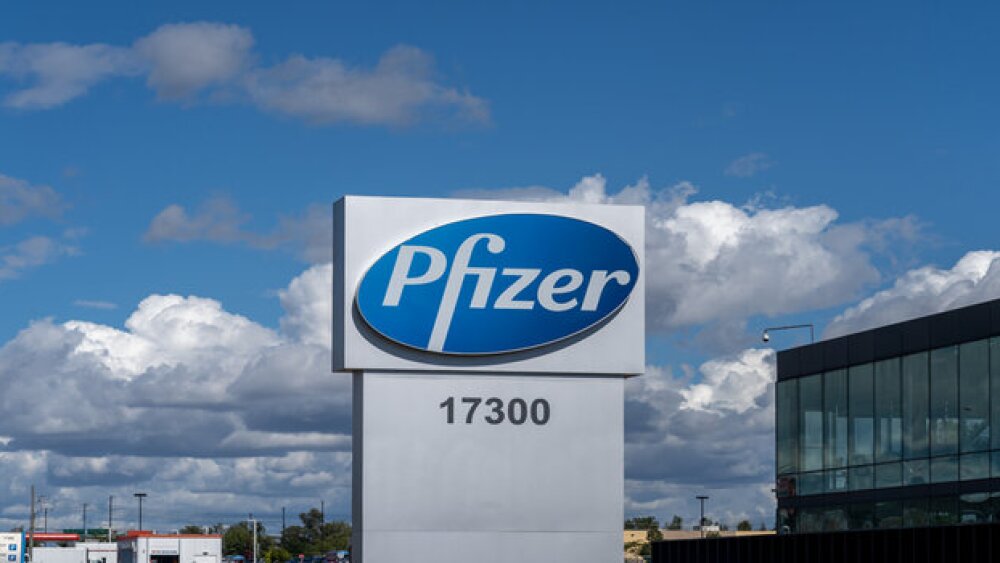Amid falling COVID-19 revenues, Pfizer continues to invest in antibody-drug conjugates in a deal with Nona Biosciences worth $1 billion as its $43 billion Seagen buy closed on Thursday.
Pictured: Signage outside Pfizer’s office in Canada/iStock, JHVEPhoto
Pfizer on Thursday entered into an exclusive license agreement with Massachusetts-based biotech Nona Biosciences to develop the mesothelin-targeting antibody-drug conjugate HBM9033 in solid tumors.
Under the deal, Pfizer will pay Nona $53 million in upfront and near-term payments and will pledge up to $1.05 billion in certain development and commercial milestones. Nona will also be eligible for tiered royalties on net sales, ranging from high-single digits to the high teens.
Thursday’s licensing agreement is centered on HBM9033, an investigational antibody-drug conjugate (ADC) that targets the human mesothelin protein, which is a known tumor-associated antigen that is typically highly expressed in different solid tumors.
Preclinical studies have demonstrated “superior potency and safety” of HBM9033 in various tumor models, making the candidate a “potential globally best-in-class therapeutic option,” according to Nona’s announcement on Thursday. In August 2023, Nona announced that the FDA had cleared its Investigational New Drug application for HBM9033, allowing the candidate to enter clinical studies.
HBM9033 was developed using Nona’s Harbour Mice platform, which leverages the company’s two proprietary transgenic mouse platforms that it uses to produce human therapeutic antibodies. According to the biotech’s website, these mouse platforms have “extensive potential for generating both conventional as well as the next-gen biologics.”
Nona Chairman Jingsong Wang in a statement said that the partnership with Pfizer is a “significant milestone” for Harbour Mice and affirms Nona’s capabilities for discovering and developing therapeutic antibodies.
For Pfizer, Thursday’s contract with Nona comes on the heels of its $43 billion acquisition of ADC pioneer Seagen, which it closed on the same day.
Announced in March 2023, Pfizer’s buyout of Seagen will enrich the pharma’s cancer ADC portfolio with four FDA-approved drugs—including Adcetris (brentuximab vedotin), indicated for Hodgkin lymphoma and Padcev (enfortumab vedotin-ejfv), for the treatment of locally advanced or metastatic urothelial cancer—as well as nearly a dozen new molecules and an ADC development platform.
The deal attracted antitrust scrutiny, with the FTC requesting more information in July 2023. However, the acquisition cleared all regulatory hurdles earlier this week.
Pfizer’s big investments in ADCs come as the company weathers tough financial times. On Wednesday, Pfizer revealed its 2024 outlook announcing that its expected revenues would only be flat or could even fall compared to this year’s. In its third-quarter 2023 earnings report, the company posted a 42% drop in revenues compared to the prior year, marking its first quarterly loss since 2019.
In October 2023, Pfizer launched a sweeping cost-cutting program, including layoffs, which originally was designed to generate $3.5 billion in savings through 2024 but which is now targeting to save $4 billion.
Tristan Manalac is an independent science writer based in Metro Manila, Philippines. He can be reached at tristan@tristanmanalac.com or tristan.manalac@biospace.com.






